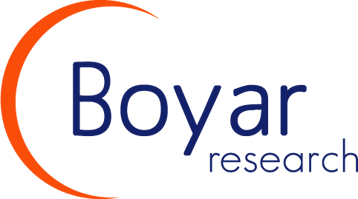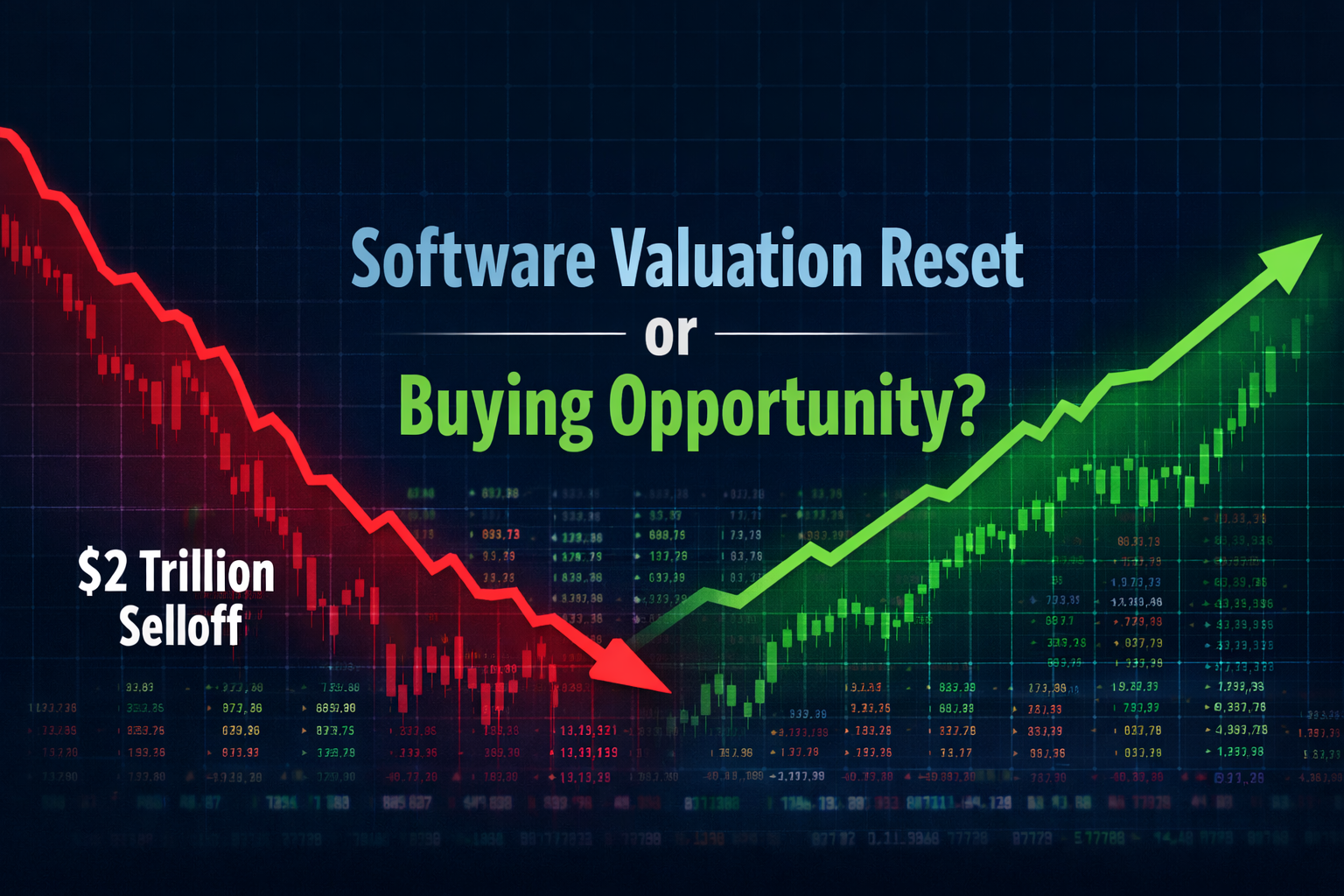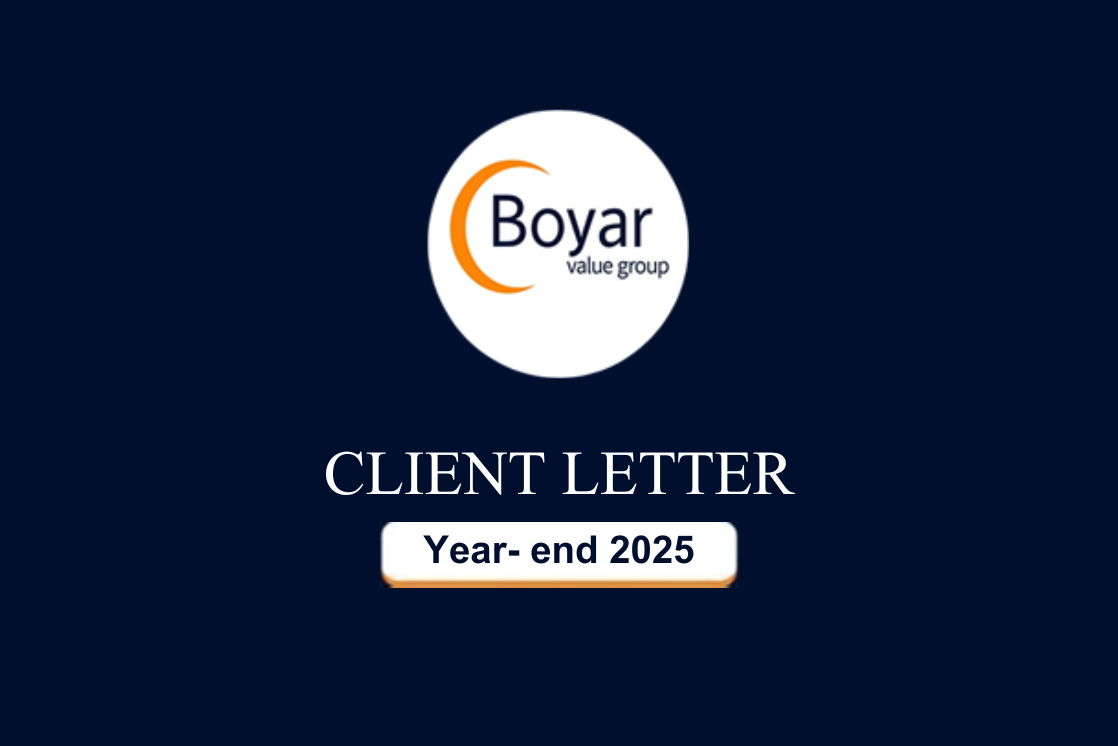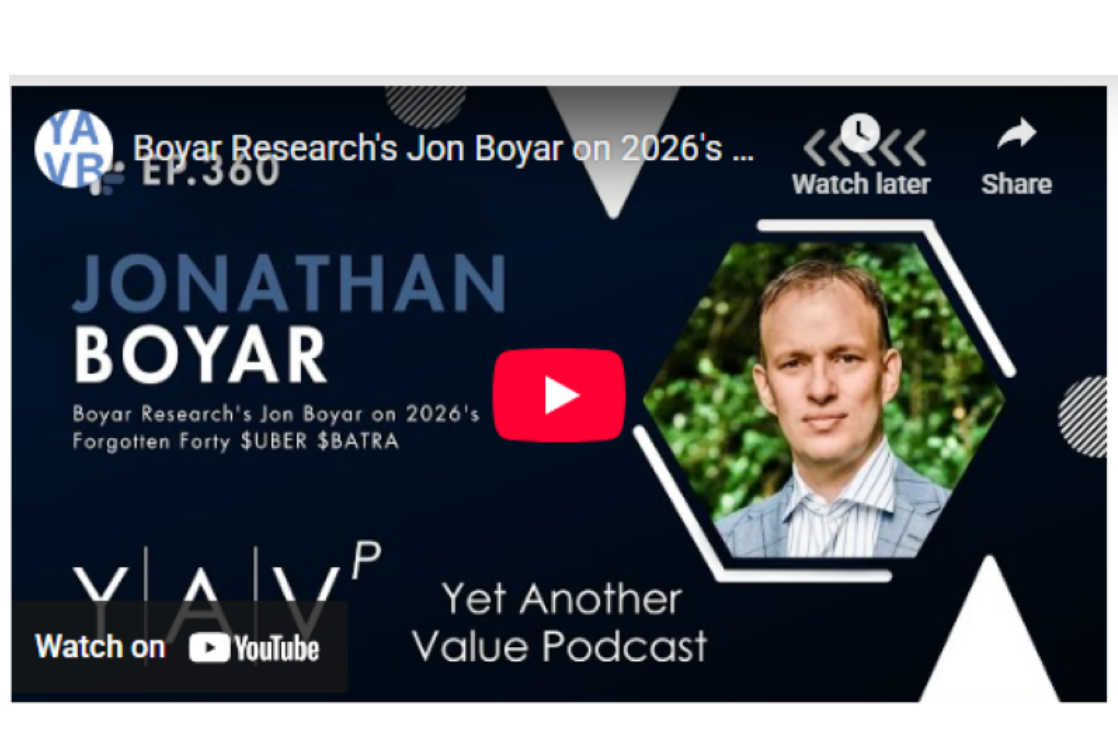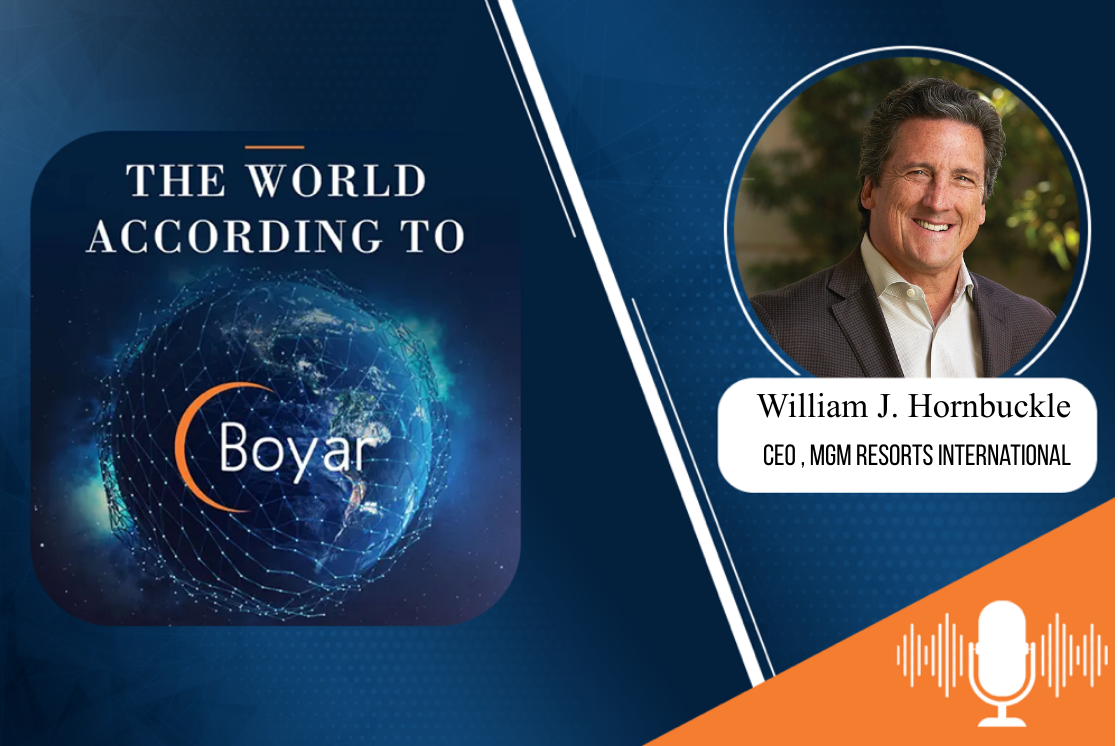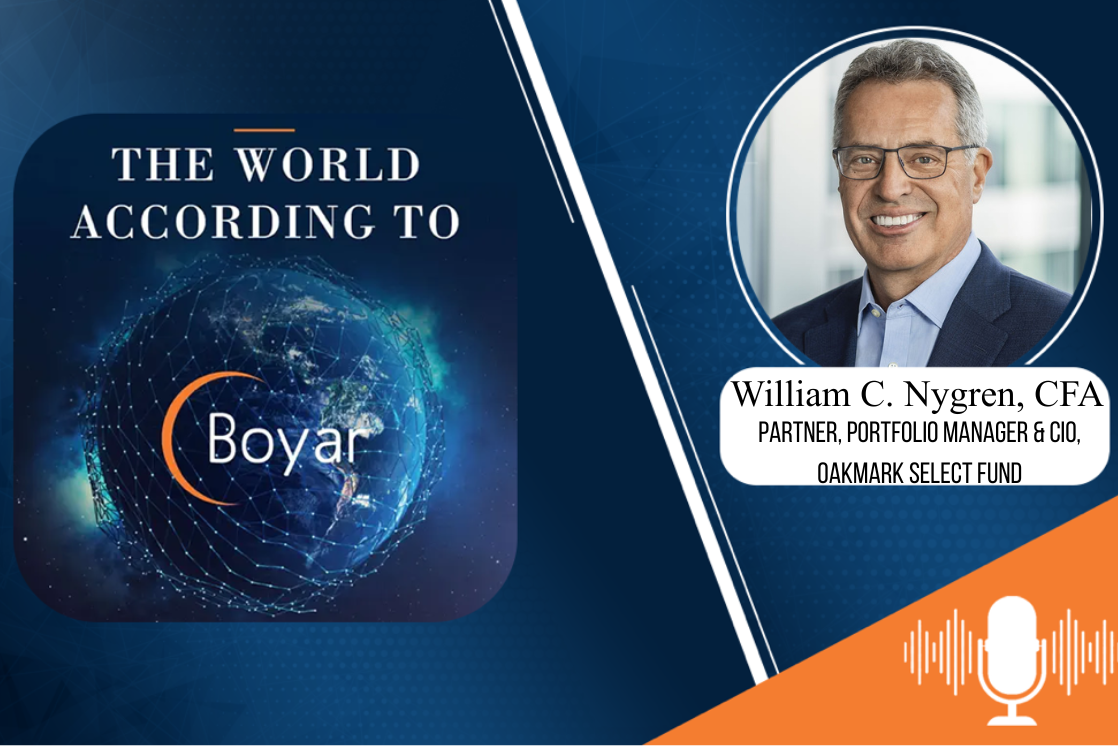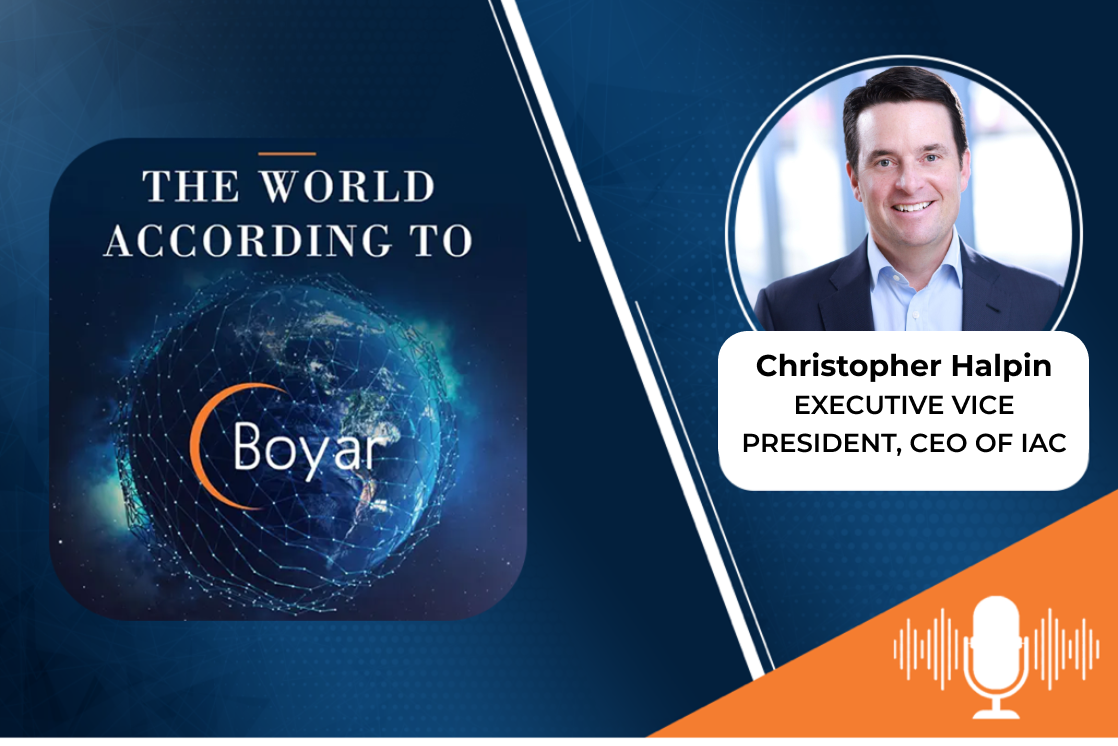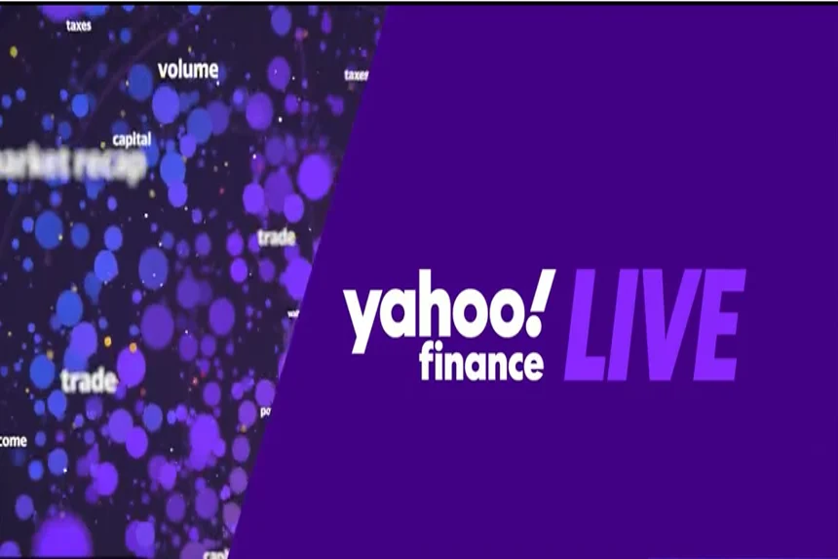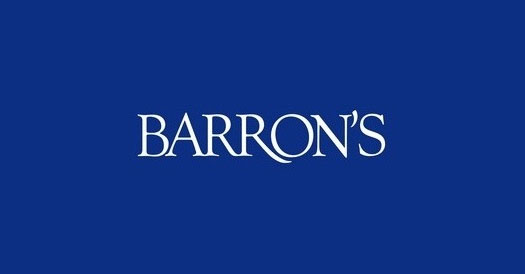AI, Indexes, and Independent Research: Inside Morningstar’s Strategy with CEO Kunal Kapoor
Never miss another podcast. Click here to subscribe today to Boyar’s Substack and get all the new podcasts sent straight to your inbox.
The Interview Discusses:
- Kunal Kapoor's Journey: From starting as an analyst to becoming the CEO of Morningstar, a leading firm in the financial services industry.
- Morningstar's Mission: Empowering investor success through independent research and innovative tools.
- Market Evolution: The shift from simple portfolios of stocks and bonds to more complex investment vehicles like private equity and managed portfolios.
- Impact of AI: How Morningstar is integrating AI into its research process with tools like Mo, and the future role of AI in fundamental analysis.
- Morningstar's Growth: Expanding into new areas like private markets, credit ratings, and index creation, and the challenges of scaling a large organization.
- Investment Philosophy: The importance of simplicity, low-cost investing, and the value of time arbitrage in achieving long-term success.
- Challenges of Leadership: Managing a growing, decentralized team while maintaining Morningstar's mission-driven culture.
- Credit Ratings Business: Morningstar's approach to ethical credit ratings and its competition with entrenched players.
- Morningstar's Competitive Edge: The benefits of being a mission-driven, long-term-focused, and independent company in the financial industry.
- Family Controlled Businesses: Thoughts on investing in family-controlled companies
About Kunal Kapoor:
Kunal Kapoor, CFA, is the chief executive officer of Morningstar. Before assuming his current role in 2017, he served as president, responsible for product development and innovation, sales and marketing, and driving strategic prioritization across the firm.
Since joining Morningstar in 1997 as a data analyst, Kapoor has held a variety of roles at the firm, including leadership positions in research and innovation. He served as director of mutual fund research and was part of the team that launched Morningstar Investment Services, Inc., before moving on to other roles including director of business strategy for international operations, and later, president and chief investment officer of Morningstar Investment Services. During his tenure, he has also led Morningstar.com® and the firm’s data business as well as its global products and client solutions group.
Kapoor holds a bachelor’s degree in economics and environmental policy from Monmouth College and a master’s degree in business administration from the University of Chicago Booth School of Business. He also holds the Chartered Financial Analyst® designation, is a member of the CFA Society of Chicago, and served on the board of PitchBook, a private firm that provides a comprehensive private equity and venture capital database, prior to its acquisition by Morningstar in late 2016. Kapoor is also a member of the board of trustees of The Nature Conservancy in Illinois. In 2010, Crain’s Chicago Business named him to its annual 40 Under 40 class, a list that includes professionals from a variety of industries who are contributing to Chicago’s business, civic, and philanthropic landscape.
Click Below to Read the Interview Transcript
Transcript of the Interview With Kunal Kapoor:
[00:00:00] Jonathan Boyar: Welcome to the World According to Boyar, where we bring top investors, bestselling authors, and business leaders to show you the smartest ways to uncover value in the stock market. I'm your host, Jonathan Boyar. Today's guest is Kunal Kapoor, CEO of publicly traded firm Morningstar, one of the most influential firms In the money management industry. Kunal has worked for Morningstar his entire career and became CEO of the company in his early forties.
He has helped Morningstar expand considerably since taking the reins from the company's founder. And the stock price has reflected his progress as it is advanced a little over 300 percent compared to 190 percent for the S&P 500 over the same period. Kunal, welcome to the show.
Kunal Kapoor: Thanks for having me.
Jonathan Boyar: While Morningstar needs no introduction for people in the financial services industry, for those outside of the business, can you just give a brief overview of what Morningstar does?
[00:01:03] Kunal Kapoor: Yeah, if I had to boil it down, our mission is to empower investor success. And so at the end of the day, our goal is to provide research and help investors build portfolios that are appropriate for their goals.
And we do that in many ways, obviously we help investors who are do it yourself type of investors, but largely we reach investors through financial planners who are a big part of our business, as well as institutional investors who use our tools and services ultimately to serve the individuals who entrust them with their money.
So at a high level, that's what we do. At a more micro level, we're fundamentally a data and research firm. We collect a lot of data and that data is what allows us to not only build databases, but put our unique IP on top of it, provide research, provide ratings. And the research piece is really important because it's at the heart of our mission and also unique in the sense that it's independent research.
And I've been in the industry long enough to know that many firms claim to be independent, but. Very few can live by it. And, you know, I grew up here as an analyst myself. And so I have a deep respect for what it means to have independent research. And I can tell you that's a fine tradition that continues to exist at Morningstar today.
[00:02:31] Jonathan Boyar: That's really helpful. The independence is critically important. And I know Morningstar was, I don't know if you were involved with it then, but was a big beneficiary of the Wall Street settlement and early 2000 era.
[00:02:42] Kunal Kapoor: Yeah, so I think what you're referring to is when the then Attorney General Spitzer had done an investigation into conflicts on Wall Street and had essentially set up a fund that allowed for the creation of more independent research.
And we certainly saw growth in our business as a result of that. I'd say that if you kind of go back and look at all the other firms that benefited from it, very few stuck with it. We have. And to this day, equity research is a very important part of what we do.
[00:03:12] Jonathan Boyar: Well, equity research, it's near and dear to my heart.
That's what we do at Boyar Research. Is this a business you continue to invest in?
[00:03:21] Kunal Kapoor: Yeah, absolutely. And I wouldn't take a narrow view of it, right? So what's changed in the past couple of decades is that the private markets have grown fairly substantially as well. And so today Morningstar is also the leading provider of data and research in the private markets through our pitch book unit.
And so when you say, are we investing behind it, we tend to invest wherever the investor portfolio is going. And if I go back 25 plus years ago, a portfolio was simple stocks, bonds, cash, for the most part, people may have had other instruments, but that was the vast majority of it. And today you have a lot more going on.
You have collective investment trusts that show up in 401ks. You have managed portfolios that a lot of advisors are using. You have PE and VC. That are legitimate asset classes. You have the rise of private fixed income. You have traditional fixed income mutual funds whose mandates have expanded pretty dramatically beyond just owning plain vanilla type of bonds.
And then you have equity funds that not only do you have long term only funds, but you also have an increasing number of what are called interval funds. which are branching into other parts of the universe. So yeah, we're investing in research, but there's a lot of vehicles that cover the landscape in that context.
[00:04:41] Jonathan Boyar: You had mentioned there's a lot more alternatives out there. I don't mean alternatives as an asset class. There's just a lot of different things for people to invest in. And I realize you're following where investors are going, you're not influencing where investors are going in terms of the products you bring to market.
Has that been a good thing for investors or most investors better off keeping it simple stocks and bonds and not being so esoteric?
[00:05:05] Kunal Kapoor: Yeah, I think simplicity is a really good thing. And the thing that I would add to your stocks and bonds comment is low cost. Cost matters, and one could make a reasonably strong argument that the reason Active has largely underperformed is because fees have been too high.
Low cost Active has actually done just fine. And so, yeah, I do believe in simplicity of portfolios. I think it's a good thing. But I will say for investors who have the means, given the large number of companies that are going private more than a hundred a year is sort of the run rate these days. I think to the extent you can get some exposure there, it's not a bad thing.
And it is additive to a portfolio. And I'm more positive on it than I was maybe a decade ago for the simple reality of the fact that the number of stocks is shrunk, at least on US exchanges. And so I do think to the extent you have some access, it makes some sense, but obviously you're giving up the majority.
A lot when it comes to thinking about liquidity, transparency, and also fees are relatively high in that space.
[00:06:09] Jonathan Boyar: In terms of technology behind the research, I know you've invested a lot in something called MO, which is a really cool tool. I've seen demonstrations of it, which is using kind of an AI chat box.
And there was an article, I don't know if you saw it in the Financial Times about a week or so ago, how JP Morgan is basically bringing AI research analysts, which a lot of my colleagues are kind of scared about. They think they'd be out of a job. But where do you see technology and AI in the research process, specifically for fundamental research?
[00:06:41] Kunal Kapoor: Ultimately, if your edge was taking a financial set of documents and basically converting them into a model, that's not much of an edge. And essentially some of the early work that's being done is to automate things like how do you pull data out of a financial report and populate a model? How do you ensure that you find correlations between companies?
How do you ensure that if you're looking at a transcript of a management team talking to investors, that you can kind of pull out a summary without having to read pages and pages? Those all seem like very good and reasonable use cases. They don't get away from the core question of how do you add value?
I don't think that's where most research analysts add value. And so the bar for adding value will continue to rise. It's already a very high bar. But I think different analysts will continue to find a way to have an edge. And I think it depends kind of where you look in the universe. But it strikes me that there are still things that can provide plenty of edge.
Time arbitrage is the one that we at Morningstar always come back to. AI does not get rid of that. The fact that people are impatient and trend chasers, and we'd often tell you that you're better off going the other way. And that's a pretty simple exercise you can do if you just have the time arbitrage to work through.
[00:07:57] Jonathan Boyar: Yeah, no, we're big believers of that. I don't know if you've read the Jim Simons biography by the Wall Street Journal reporter. At the end, he talks about one of the things that quants can't really do is that time arbitrage.
[00:08:10] Kunal Kapoor: Yeah. Yeah. For a long time, we've done this buying the unloved study at Morningstar.
And essentially what it is, is at the end of every year, we look at the asset classes that have experienced the most inflows and outflows. And the idea is you buy the unloved and it's amazing. The unloved has a remarkably good winning streak. I think off late, it's maybe suffered a little bit given the run that certain concentrated parts of the markets have had.
But over time, I think it's been quite predictive.
[00:08:39] Jonathan Boyar: Just wanted to take a quick step back. I mean, you've had a very interesting career. And as I mentioned in introduction, you've been at Morningstar your entire career, which is pretty unusual, although a previous guest, also from Chicago, so maybe there's something in the water, Melody Hobson, has been in the same boat, so you're in good company.
What is it about Morningstar that inspires Wipers as your firm also has a pretty high retention rate?
[00:09:02] Kunal Kapoor: That's something I think a lot about as CEO how and why do great people want to stay here? And when I talk to other companies and ask them what their secret sauce is as well, people always say well, it's the people and we have great people. And so it'd be a little cliche for me to stand here and say it's great people even though it is. And so in what context is it great people and I think in our case, it's a few things. One is, we hire broadly, we don't just hire people with financial backgrounds, we hire people who can think and we try to then give them the tools to succeed.
And that often means we hire people with eclectic backgrounds, with track records in other parts of the economy. We hire kids out of college who don't necessarily have the typical finance background and we give them the shot to come in here. But the thing that binds us is the mission. Empowering investor success.
And it's very meaningful to be part of a firm where you can get up and feel good about what you're doing every day and why you're doing it. And I think that's a very big edge and a reason why people build their careers here at Morningstar. I'll also just add that place has significant premium on being financially successful.
We run a growth business and growth creates opportunity for people. And it ensures that the careers that people have and the opportunities available to them are significant. And so, as much as we create a great environment and all of that, we also very much focus on the financial outcomes here and we're very competitive.
In that context, and when I look at Morningstar today versus Morningstar 10 years ago, 20 years ago, 25 years ago, it's a very different firm. You couldn't probably recognize it in many ways. We're the fourth largest credit rating agency in the world today. We're the leading light in private and VC markets.
Obviously, when it comes to funds and equities, we're very well known. That's been sort of our core bread and butter. And so the firm has created all these opportunities when it comes to retirement, one of the two leading providers today in managed accounts. So you can kind of go on and on. Many of those businesses are things that didn't exist at some point.
And when you're building a career, you want that growth at the firm you're a part of as well as in your career.
[00:11:13] Jonathan Boyar: That's really interesting. And when you're incentivizing employees, it's obviously very different in a small business versus a large business. You're a publicly traded firm in stock based com, is that how you do it?
And also you have that diversity of businesses. So someone who's in equity research probably has very little to do with the success of your credit rating business. How do you put everyone going in the same direction?
[00:11:40] Kunal Kapoor: First of all, if I take a step back, we're about 11, 000 people globally. So compensation practices obviously vary depending on where things are.
But one thing that binds us is that we think about things in the long term sense. And so you cited the fact that we're a publicly traded company, and we are, and we take that incredibly seriously, but we don't fall into the pattern that sort of leads to a lot of short term incentives for other companies.
We don't do earnings estimates. We don't spend our time talking after we report earnings to analysts. Instead, we try to answer questions on a monthly basis in a very meaningful way in a filing. We have an annual shareholder meeting where we do live Q and A as well. And so we've tried to copy the Buffett model and done a few other things.
I write a shareholder letter every quarter and then annually, a longer letter as well. So we really try to provide investors with valuable information that helps them evaluate the business. And candidly. We end up with investors who do have a long term view as a result. And I think other businesses could learn from that. And so, when it comes to incentives, you start with time horizon because time horizon matters, you have to hold yourself accountable, obviously, to those time horizons, but it's very difficult when I look at other firms who are trying to, you know, manage businesses, quarterly time horizons, and we don't do that with our teams. I also run the business in a fairly decentralized way manner.
And so, when you ask, how are people in different units impacted by the performance, it tends to be unit based. We do obviously have some incentives that run across the company, but we tend to ensure that our units are very focused and have the ability to execute themselves. I just, I believe personally in a model of decentralization.
[00:13:25] Jonathan Boyar: Thank you. One of the things just about incentives and work ethics. My last interview was with Interactive Brokers founder, Thomas Peterffy, who's really a super interesting guy. I don't know if you've had the chance to meet him.
[00:13:38] Kunal Kapoor: I listened to the podcast, but I haven't met him.
[00:13:40] Jonathan Boyar: He immigrated from Hungary and one of the things he partially credited his success with is being an immigrant, which made him have a better work ethic.
And I totally get it and appreciate it. You came to the U. S. from India for college, I believe, and became very successful pretty early in life. Is there something to what Thomas said?
[00:14:00] Kunal Kapoor: Well, I'm not an expert on that topic, but certainly I think the immigrant story in the U. S., you can point to many people over time who have been immigrants and contributed tremendously to this country and had the drive to do that.
And I certainly think it's part of my narrative as well. And I'm very prideful of the fact that I'm an immigrant and have been able to contribute in a productive way and had some of the success that I've had. And so certainly that is part of what drives me. It's part of my identity. And yeah, I can point to many successful immigrants as well.
And it's part of the American landscape and story. And it's one of the many reasons why I think our country is as successful as it is.
[00:14:42] Jonathan Boyar: You're still very young, and if you continue delivering the results that you have, I imagine the board will want to keep you on indefinitely. Your success speaks for itself.
Do you worry, and I think about this with Jamie Dimon and a couple others, that it might cause talented people to not stay as there might be a ceiling on their career path. Like, how do you deal with that?
[00:15:03] Kunal Kapoor: First of all, like you never take anything for granted as a leader and you want to make sure you're in a job as long as you feel like you could drive things and you're excited by it and you're right, I very much am. And I continue to think in that way. I'll go back to the firm being a growth firm and for many of our leaders and people, even on the executive team, if you look at the careers they've had, they've taken on a lot of opportunity. and done different things in their careers. And to this day, as Morningstar grows, it's going to create different opportunities for them.
And so, we've certainly over time had success that has resulted in some talented people getting opportunities elsewhere. And some have taken them and some have not. What I'll say to you is I think what binds us all together is there's a desire to make this firm even more special and to ensure that all the people we're trying to help get to the spot that they want to.
And we know what good looks like in our industry, and Morningstar represents that. And so, for all of us, it's really special to keep trying to grow this firm. And I hope we don't kind of wake up and wonder about like, when is this person here or whatever? It's just not in our DNA to think in that fashion. Instead, I think we're all part of the team that's helping grow this firm.
And certainly as CEO, I'm the leader, but I think of the team as having an equal share in that success. And hopefully they feel that way as well.
[00:16:25] Jonathan Boyar: As a CEO of a company that has a big growth trajectory in front of it, what keeps you up at night? What worries you besides a financial calamity where equity markets or capital markets don't do well?
What are you scared of?
[00:16:39] Kunal Kapoor: Yeah, I mean, I've answered this question in the same way for as long as I've been CEO and I think the magnitude of it is only increased with time. And that is that the thing that keeps me up at night the most is the next person that we hire at Morningstar. I was here when we were two to three hundred people.
I know what it's like to be part of an entrepreneurial culture. I know what it's like to just want to drive things, take ownership. And I know what it's like to fight for survival, candidly. And so, to this day, I have that mentality in place. You talked about that even from an immigrant lens. It is very much in my DNA to kind of want to get after everything.
And I do worry that as the next person is going to walk in here, gonna have that drive, is that person gonna have that fidelity to our mission? And I worry just about how we keep that alive because I'm sitting here in Chicago, and certainly I can have a huge impact here, but let's say, someone's sitting 12 time zones away from me.
How do we ensure that that person is hired well, onboarded well, that their career is managed well, that they've got the right level of feedback and engagement, and that they do the right thing. Because our firm, so much of it is built on reputation and trust and it worries me as we become bigger that we just got to kind of make sure that the next person who walks in the door feels as committed to it as all the people who walked in prior to that and kind of done that.
And then I also worry about problems of success, right? Like you look at it today, we're a 2 billion plus company. When I think about, okay, how are we going to grow 10 percent in a year? That means we have to go create 200 million in new revenue in the next year. That's like creating a new company. When I started Morningstar, we were many multiples of that smaller, just as a company in and of itself.
And so you worry about things like large numbers. How do you do that? And how do you execute well against that? How do I grow myself? How do I grow my team? How do I keep this place special? And those kinds of things are always top of mind for me as well.
[00:18:45] Jonathan Boyar: So how do you do that? How do you make sure that the next employee has the same mindset as when you are at 250 percent curve?
[00:18:53] Kunal Kapoor: The most effective way I can do it is to model it and all of us who are in the senior team try to model the behavior that we want and that we expect. And I've learned also over time the value of storytelling to connect people to where we came from, to where we are today. Today, this is Morningstar's 40th year, and we've done a lot of looking back and storytelling.
And then one of the primary reasons we've done that is to connect people. But at the end of the day, you got to embody the behavior. You got to think about the way you kind of do things in that sense. Just last week, we were doing our interviews for next year's Morningstar development program. And you know, maybe surprising to you, but I was interviewing interns and undergrads.
And as I was walking around, we kind of move around different floors and kind of a rapid fire pace to interview these aspiring applicants. You know, I saw other members of the executive team and senior leadership team making the rounds and doing the interviews and at other companies, you don't get that.
I have a story I like to tell. A few years ago, I interviewed a college kid and he said, at the end of the interview, I said, do you have any questions? And the guy very sheepishly asked me, he's like, so what does it feel like to have the same name as the CEO of the company? And, you know, it struck me later on.
The reason he asked the question is because he was so shocked that senior members of our team were down there interviewing him. And so, I think we do things like that. And it's important, even when you become 10, 11, 000 people, because you want senior leaders sitting in other parts of the world to see that behavior and emulate it and kind of carry it forward.
[00:20:27] Jonathan Boyar: When you're interviewing those kids who just came out of college and regardless of what they say, they know nothing or very little about working in the financial world. What do you ask them to try and find those great people?
[00:20:40] Kunal Kapoor: Well, you want me to give away my secret sauce?
[00:20:43] Jonathan Boyar: Yeah, your secret.
[00:20:45] Kunal Kapoor: I'm not the person who's gonna sit there and spend a lot of time trying to determine their financial acumen.
We have other people who do that and generally, when I look at the resumes that come in, they're very talented undergrads who I think would be well placed to be in any firm. But what I spent time on is their learning capacity, their growth capacity. And I try to understand the things that have driven them, the life events that perhaps have had a significant effect on them.
I'm always interested in who's on people's personal boards. How do they fill out their personal boards? And it's kind of a good look into who's influencing them. And I love to know what they're reading. And the kinds of classes that they would do if they were not forced to pick certain classes in school.
So I don't ask like, what classes are you doing? I ask, what classes do you wish you had had a chance to do and try to find out how people think and how they may act.
[00:21:37] Jonathan Boyar: If you are enjoying this podcast, all of the World According to Boyar podcasts, as well as additional articles and research reports can be found at https://boyarresearch.substack.com/.
Now back to the show. You had mentioned before you're celebrating your 40th anniversary and it was started in the founder's basement or apartment in 1984. And he still controls the company at his well over 30 percent stake. What's it like working for a controlled company?
[00:22:07] Kunal Kapoor: Well, first of all, I would just say Joe does not let anyone feel like it's a controlled company.
We run this company with the notion that all shareholders have an equal stake and we're trying to please them with great long term results. So I've never heard him say, I'm a controlling shareholder and I'm going to do things this way or that way. He's running it and we're running it with the mindset of creating value for everybody here.
But what I will say is it has allowed us to double down on the importance of our mission. On the way we run ourselves as a public company. And it's allowed us to make bets that take time sometimes to play out and that other companies might not be willing to do as a result. But overall, I would say that, you know, the most important thing is that it's allowed us to have a culture and Joe's been a very important culture carrier and one of my important roles is to be the next culture carrier. And so those things matter a lot in our context. And at a personal level, Joe's my mentor and the person that I go to when I have questions. And we talk several times a week usually. I just had lunch with him the other day.
And so it's very important from an ethos perspective, how that relationship plays out.
[00:23:27] Jonathan Boyar: Do you think it gives you an edge? I mean, you don't have to generally worry about activist investors and short termism because you have someone who cares about the business with a big stake, or is it kind of neutral?
[00:23:40] Kunal Kapoor: I think it gives us an edge to the extent that that we take advantage of the potential benefits it bestows, such as the long term approach. It wouldn't give us an edge if we were passive about it, if that makes sense. So we don't take it for granted is what I'm trying to get across. But to the extent that there are ways that we can create value over time, I certainly think it does.
Yes.
[00:24:01] Jonathan Boyar: At Boyar Research, we've historically found a lot of value investing in family controlled companies, as oftentimes the market undervalues them. I think of News Corp or some of the Madison Square Garden companies, but there certainly are minefields. What do you think investors should look at when looking to invest in a family controlled business?
[00:24:20] Kunal Kapoor: Yeah, I mean, as with anything, I think you want to be careful with generality. I've certainly seen some competitors of ours over time that are family controlled, and I would say they've been run for the benefit of the family and not for the benefit of all those stakeholders, especially the shareholders.
And so oftentimes when that's the case, they run sort of more as cash cows. As opposed to true growth enterprises. And so I always kind of look for that. And I would just say that while I agree with you that there are some really good businesses that are family controlled, I think it can only be one in many factors that you consider and to the extent that it's important to you, I think you really have to evaluate what the ultimate motives are of a family in kind of running the business and whether that aligns with the view of how value is created for all shareholders?
[00:25:15] Jonathan Boyar: No, no, absolutely. And to be clear, it's more of a screening tool than anything else.
[00:25:19] Kunal Kapoor: If you're asking me, I like it too, when I'm investing, if I come across those situations, I like them and I will investigate them.
[00:25:25] Jonathan Boyar: Well, when I was investigating your firm and doing research for the interview, I thought I'd be able to go to sell side reports and was surprised to only see one sell side firm that covered your company. I mean, you're a 13 billion or so market cap company. Why do you think that is?
[00:25:43] Kunal Kapoor: Because we don't talk to analysts.
[00:25:44] Jonathan Boyar: Okay. So you don't make their job easy.
[00:25:44] Kunal Kapoor: I mean, you and I started this conversation by talking about how you add value as an active manager. If you really want to do it, I think you want to think about how. You build a model for a company over time and how that company can compound and grow capital.
And oftentimes, as you know, the calls and things like that are not about that. They're very much about how to assess the current quarter and kind of move a few digits here or there in a model. And I don't think that's a great use of research capacity personally. It's not how I would evaluate a business.
[00:26:20] Jonathan Boyar: Do you think it negatively impacts your valuation in certain ways?
[00:26:24] Kunal Kapoor: I don't think about that. I fundamentally believe markets are efficient. And I think over time when we've had strong runs, our stock prices reflected that. And there have been occasions where the business has not done as well as we would like, and the stock prices reflected that.
But over the long run, we've run a successful business, and I think our shareholders have benefited from that as well.
[00:26:48] Jonathan Boyar: One of the things I really like about your research, you have this thing called bull say, bear say. Yeah, it's a really great part of your research, which I enjoy it. Obviously, you would never do a report on your own company.
If someone was writing one, what do you think they would say
[00:27:03] Kunal Kapoor: on both? Just as we don't talk to analysts, I want to be careful here in terms of what I say, but we've said a lot of the things that I think would fall into those categories. Morningstar is a business that's mission driven, that has some very significant secular tailwinds behind it.
And we are really thoughtful, I think, in the way that we allocate capital and hold ourselves accountable to that. On the other side, we're a larger company than we were. And that means that we and our stakeholders obviously need to adjust to that and think about how do we recreate the success that takes us to the next level.
And it's also the case that we've benefited from being right on calling several tailwinds, including the shift, or I should say, including the convergence of public and private markets. And part of our ability to be successful in the future is going to be to continue to pick secular growth areas in our business.
But I think like we have a capital like business that ultimately, you know, the success of the business is driven by our ability to help investors. And it's a very nice model to have because at the end of the day, when the end investor wins, the benefits of that flow back through the chain to us. And while investors have won on many fronts over the past couple of decades, there are so many other things to solve for them.
And so I feel optimistic in that context.
[00:28:28] Jonathan Boyar: Well, some of the new businesses are relatively new businesses that you have made a foray into is one is the index business, which is very interesting. What opportunity did you see there?
[00:28:39] Kunal Kapoor: A really big one. And we continue to see it today. So, we're now the fastest growing, we're only index business globally and have been for a few years of any size.
And one of the reasons people are coming to us is because the cost of indexes is nonsensical relative to the value delivered in the traditional sense. And so you've seen this massive collapse in active management fees and yet the cost that active managers and passive managers have to pay to track indexes and use data from indexes is very significant.
And it's only risen. While you've had this other trend going on where costs have come down. So it makes no sense because there's very little difference between key market indexes. And so if you take the Morningstar US market index, it's as good a representation of the US market as some other better known indexes.
And yet you can have it at a much lower cost. And I think that's good for investors. And so we've sort of thought that not only is there not enough value provided with the indexes that exist today, they kind of do what they do because people kind of know the names, but not because of the value. And then we think, over time, as new index categories are created, we can participate there.
We're also unique in the sense that we take our research IP, including our equity research, and we create indexes that have that IP in them. So if you look at MOAT, which is a VanEck mode, it's using our equity methodology to create a portfolio of wide mode, undervalued companies. And the record there has been incredibly strong over time.
And so, we've got these two unique sort of legs there and we're having a lot of success in that part of the business and I think it'll continue because fees are only going to continue to remain under scrutiny as they should in terms of what index providers are providing.
[00:30:37] Jonathan Boyar: Besides costs, there's some obviously very entrenched players, S&P, Dow Jones. How do you compete? For example, a lot of the less sophisticated investors might still cite the Dow Jones, even though it's not necessarily a particularly great gauge of the US economy.
[00:30:55] Kunal Kapoor: I mean, the reality is it's hard to change behavior when some things are entrenched. And so that is what it is.
What we think about is there's so many new products, so many new opportunities where we can link indexes. And so we try to think about the future as opposed to trying to go and rewrite the past, where it's much harder to get people to switch and get consultants to do all of that. Honestly, when we started, we thought we could do that more successfully, but it's really quite challenging.
And some firms have done it, but we kind of think about it more so from a new product creation perspective. And even with the entrenched players, I think they shouldn't expect that prices will come down.
[00:31:35] Jonathan Boyar: Speaking of entrenched players, you also went into the credit ratings business, which is really entrenched.
What opportunity did you see there?
[00:31:44] Kunal Kapoor: Well, so we entered the credit ratings business in a meaningful way post the global financial crisis 07, 08. You don't need me to recap the story there, but fundamentally, I think investors felt a compact was broken and that they had been let down by the leading credit rating agencies.
And I think there was widespread regulatory support for another competitor to come in. So we started there, started to build our business, and then along the way, the opportunity came up on DBRS, which is the premier credit ratings agency in Canada. So we were able to combine what was then Morningstar credit ratings.
with DBRS. And today we have Morningstar DBRS, which is the fourth largest credit rating agency globally. Many of the things that I highlighted back from 07, 08 have not necessarily changed. I don't hear people say we love working with the three legacy firms that have kind of had a significant share here, but they feel stuck because it's again, back to investment committees where it's written, you have to have two of the three entrenched players or what have you.
Our proposition has been our research is awesome. And we're going to do it right. Plus what we're asking for is not that you suddenly say it's now two of the four or whatever. We're just saying any NRSRO should have an equal shock at vying for business. And so again, here too, it's a long slog. It's obviously a huge market, but what we're finding is that the market is growing in different ways and we have great opportunities.
So for instance, you're well aware that more and more commercial lending is happening outside of what I'll call the traditional banking system. Okay. And there's a big opportunity to rate that debt. And so we've been focused on adjacencies like that. And so we've got this great franchise in Canada. We're headquartered for this part of the business.
And we're really trying to grow it in the U. S. And it is a long term endeavor. This is a slog. There's very few firms I think that would take it on for many reasons, but the market opportunity is incredibly sizable. And I think this is one that Morningstar will be at for a while. And one that has the potential to.
Not only be very, very impactful for investors who use ratings, but one that could ultimately be meaningful to the composition of our company as well.
[00:34:09] Jonathan Boyar: One of the things about the credit rating business is it's something called issue or pay model, where basically the municipality or whatnot pays or the company pays the company for their ratings, which is somewhat at odds with Morningstar's independence. How do you square the two ethically and in practice?
[00:34:29] Kunal Kapoor: Yeah, and ultimately, what I'd say here is the research has to stand for itself. And the analysts are not ever in a position where they're expected to put a certain rating. On an issue, they do the work independently and across Morningstar, whether it's credit research, equity research, manager research, or now private market research, the analysts have the ability to do their work independently, and that's the model we're going to keep.
Kind of going here, as I said at the outset, it's so easy to say you're independent and not live up to it. For us, it's in our ethos. It's in our bones. And so I think not just in credit ratings, broadly, we do lose business because we say the things that others aren't willing to say. And all I'm going to say is it's not going to change in the credit business because of the revenue model.
[00:35:21] Jonathan Boyar: You started out as an analyst and you never stopped being an analyst. I think I annoy all our analysts. I'd love to get your thoughts on the financial markets. I think based on other interviews, we're in agreement that small cap and mid cap are great places to be. But besides that, where are you seeing the best opportunities?
[00:35:38] Kunal Kapoor: Yeah, if you look at what our research analysts would tell you, we've had a very strong run in U. S. markets, obviously. But even if you unpack that and you just look at the Morningstar style box, we have something called the U. S. market barometer. If you go to Morningstar. com, it's the first thing that hits you.
What's interesting is this year on many days, the top right hand corner, which represents large growth, has been dark green. And you look at the key indexes, the Morningstar US market, or like an S&P as you highlighted, and they're up, but they're up because of a handful of those stocks that are in that right component of the market barometer.
Everything else has been lighter green or light red or dark red. And so the headlines are saying one thing and you kind of parse it out and it looks very different. So, our analysts feel like some of the companies that have powered recent gains, particularly as it pertains to AI, will have successful businesses.
But perhaps the success of those businesses has already been either priced in or overestimated. And so you could have very successful businesses, but less successful outcomes for owners of the stock. Whereas the bar is much lower in other parts of our market barometer, so to speak. You have mid caps, small cap and values stocks that seem like they are trading at discounts relative to what we see more broadly.
If you look outside the U. S., it certainly is the case that you've had a combination of underperformance of those stocks as well as underperformance of currency versus the U. S. dollar that has held those things back. So, all in all, we see some opportunities there. Now, having said that, the headline for us is that investors should have lower expectations than what they've seen in the past decade.
And people will say, oh, well, people have been saying that for a while and it hasn't panned out that way. Maybe, maybe not. But the important thing is to have the right expectations and hey, if it's better than it's better, but at least you want to plan with the mentality that it could be lower. And it's not just public equities.
We feel that way about private equity too, which has had a strong run. And it seems really hard with rates, having done what they've done in the last few years to replicate the returns of the previous vintages. Both in PE and VC, and then you have fixed income and fixed income has gone and had a really difficult time over the last few years, given where rates have ended up, especially here in the US.
And I think at least from a total return perspective, our analysts would say that there's some competitive opportunities in fixed income. So it's a good time to have a diversified portfolio that lines up to your goals. And if you've kind of gotten heavy one way or the other, I'd be careful and rebalance back.
[00:38:17] Jonathan Boyar: Are there asset classes or types of investments, maybe like cryptocurrencies that Morningstar would never touch or do research on?
[00:38:25] Kunal Kapoor: Well, we're happy to provide research on whatever's going in an investor's portfolio. We're notorious for sometimes saying that things should not go in those portfolios. So our research can be very negative on certain things.
And if you read our research on crypto, it's largely been off the mindset that we're not at the point where we're ready to call it an asset class. Some have kind of taken that leap of faith and we've largely said to people, if you're going to do it, it should be sort of in your fund money bucket. But I don't think of it as investing in the traditional sense.
[00:38:58] Jonathan Boyar: Kunal, I want to thank you for your time. I really enjoyed hearing about your personal journey, Morningstar's evolution, and your thoughts on investing and a lot more. It's been unbelievably interesting. And I just want to thank you for your time.
[00:39:14] Kunal Kapoor: Yeah. No, thanks for having me. I enjoyed it and I enjoyed the questions, and thanks for both highlighting Morningstar and me.
[00:39:21] Jonathan Boyar: hope you enjoyed the show. Remember all of the world according to Boyar podcasts, as well as additional articles and research reports can be found https://boyarresearch.substack.com/. Until next time.
Never miss another podcast click here to subscribe today!
Available wherever you download podcasts:
About The Boyar Family Of Companies
Boyar Asset Management
We have been managing money since 1983 utilizing our proprietary in-house value-oriented equity strategies. We manage money for high net worth individuals and institutions via separately managed accounts. To find out how we can help you with your money management needs please click here
Boyar Research
Since 1975 we have been producing independent research on intrinsically undervalued companies across the market capitalization spectrum and in a wide variety of industries using a business person’s approach to stock market investing. To find out how we can help you with your research needs please click here


